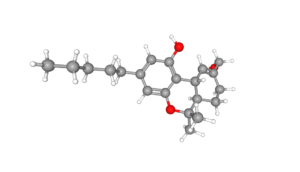What is Exo-THC?
In this Q&A, Dr. Patricia Frye, SCC Board Member and Medical Director of Takoma Park Integrative Care, asks Christopher Hudalla, Ph. D. of Proverde Labs about Exo-THC.
Dr. Patricia Frye: I had some questions about exo-THC, something that I had not come across in my readings.
I did an internet search and found that it is an impurity formed in the synthesis of Δ9-THC. Am I to assume that the Δ9-THC in a product is synthetic and not plant-derived (i.e.dronabinol)? Or something like K2 or Spice is present?
Also, if it is ingested, is it metabolized to THC-COOH? And would that result in a positive urine screen and be indistinguishable from plant-derived THC? Or does it yield some other metabolite that would identify the source as synthetic?
Christopher Hudalla, PhD: Your questions is a hot topic right now, and the subject of a lot of research going on in our lab. There have been 30 isomers identified for THC alone. These include Delta-7, Delta-8, Delta-9, Delta-10, Delta-9,11, Delta-6a,7 and Delta-6a,10a. Even for the Delta-9-THC, there are four possible structures. Of these 30 isomeric structures of THC, the plant only produces one. There’s only one single form of Delta-9-THC, and then produced as the acid before it degrades to the neutral form.

3D 11-Hydroxytetrahydrocannabinol courtesy of PubChem.
As a result of post-extraction processing and distillation, we are seeing conversions from the plant’s native Delta-9-THC structure to many of these other isomers. Exo-THC is also known as Delta-9,11-THC. And while this isomer is a known byproduct formed during the synthesis of THC (dronabinol), it can also be formed by many of these post-extraction processes used to “clean up” the extracts.
We’re now seeing a huge trend in producing products from hemp-derived CBD, converting the CBD to Delta-8 and Delta-10-THC to exploit regulatory loopholes that limit THC reporting to Delta-9-THC (as a total, including THC and THCA). The problem is we do not understand the impact of some of these isomers. Remember thalidomide? We do not know the efficacy (or toxicity, for that matter) of Delta-10-THC. Nor do we know the metabolic pathway for these isomers of THC.
Will the presence of exo-THC or Detla-10-THC result in a failed drug test? Many producers are gambling with the lives and careers of their unsuspecting consumers, who are consuming products because it is being marketed as “THC-free”. We do not know if it will lead to a failed drug test. There are many different types of test platforms. Some of them may see no difference between exo-THC and Delta-9-THC.
Exo-THC is not always an indicator of synthetic THC. There are methods to distinguish synthetic from natural products, but they are a bit more expensive. I have not seen anyone using these methods in this industry. These methods are used frequently in the pharmaceutical industry, and can even distinguish between synthetic drugs which are patented from the counterfeit products on the market.

